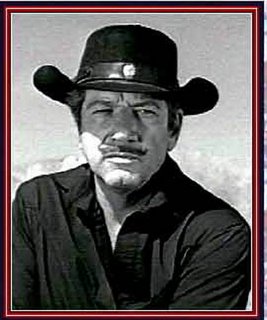In my misadventures with the small trucking company I worked for, there was one person who stands out as an enigma--in some ways a mystery, but in other ways completely transparent. He was a colorful man, part guru and part con man. Coldly calculating and passionately out-of-control. His name was Ed.
The very first time I met Ed, he was dressed with the intention of making an impression. He had a huge belly that he tucked into his new blue jeans, wore a long-sleeve, brightly-colored "cowboy" shirt, and a thin, brown leather vest over it. On top of his head was a crisp, new, white, straw cowboy hat. In 1995 he sported a salt-and-pepper goatee and mustache, which wasn't nearly as common as they seem to be today (my wife referred to the look as his "disgusting snout"). Over the five years I knew Ed, that same hat would wilt and droop with sweat, heat, and constant wear, and eventually it became both his trademark and a topic of conversation--sometimes behind his back and usually not in a positive light. Ed didn't seem to care--in fact, he seemed to enjoy the attention.

Real life isn't as simple as the movies--the bad guys don't always wear a black hat to help you identify them and, to complicate things even worse, maybe they aren't completely evil. In this case, Ed was dangerous because he was a political player who was always working the room for an advantage. His deep, kind, overly-friendly voice could lull you into a peaceful sense of security like a snake charmer's call. The characteristic that made him dangerous was the combination of the savvy sense of reading people and situations, combined with the willingness to do absolutely anything necessary to come out ahead in any situation, with no conscience, no qualms.
I had been working part-time for a trucking company and at the same time was finishing my college degree. I was hoping to continue with graduate studies and apply for medical school. My job was to analyze data and put it into a format that would help the owner, Greg, make operational decisions. The company, which Greg had recently purchased from his father, had 7 trucks, an operations manager, and rented dock and office space from another larger company. Greg, a true visionary with big ideas for expansion, had no mind for business analysis. He would often give reports back to me challenging any assumptions made in their calculations. This was a very common argument that we would have would sometimes end with me saying something like: "Greg, I can tell you right now that we're losing money on this contract. If you want to know within $100 either way, I can tell you in about 45 minutes. But if you need to know, down to the penny, exactly how much we are losing on it, it's going to take about 10 hours of work." And sometimes he would make me put in the 10 hours and show him every bit of evidence that every factor had been accounted for, just to satisfy his fear that my statistical estimates were somehow flawed.
One thing that drives me nuts about this situation is that Ed was able to read me very well. He knew that I really enjoyed what I was doing for Greg, and had the capability of being a much more valuable asset. He knew some of my story, which included moments of extreme poverty. He guessed correctly that I was currently barely making ends meet, and would seize an opportunity to establish better financial security. And he correctly guessed, and convinced Greg, that I would put my medical school plans on hold and would be a great asset to him if he dangled a new title and enough money in front of my nose--and he was right.
I became the Business Manager and gave up my "work from home" paradise with the company. I knew it was the right move for the company immediately when Greg and Ed proposed it in a meeting. Ed didn't work for the company, and I'm not sure how his association with Greg began, but he acted as a type of guru/advisor, which was easy for him because he was gifted in reading people's motivations. This ability was compounded by Greg's complete inability to do the same thing, and his utter facination in Ed's correct assessments. Ed eventually learned that this capability was valuable to Greg, and he used the relationship to constantly coerce favors from Greg.
Another part of this story that would always bother me is that, as I became increasingly successful in making our business more successful, both Greg and Ed would give Ed credit for my abilities and accomplishments, saying "We're really lucky that Ed picked you for this job!" I would smile and nod, but inside would think "Wait a minute! I'm putting in 60 hours a week and also working from home on the weekends--the success of this has nothing to do with luck!" I always felt it was dismissive of my talents and effort, but I wasn't skilled enough to pick the right time to verbalize this and diffuse Ed's credit for this--besides, the fact is that Greg was lucky, because he would have never recognized my talent on his own and the leadership move led to big financial returns for him--in my first year as Business Manager, we made the largest profit ever in the 17-year history of the company!

People would warn Greg that Ed was taking advantage of him, but in retrospect it seems that he sincerely needed the help from Ed. Greg was testing the political waters of local political groups, including pursuing contracts with major companies, and Ed's savvy helped Greg negotiate these waters. He didn't realize that, by bringing Ed along with him, he exposed this political weakness. You see, Ed was constantly about $10 from being completely homeless, and people who were in tune with people could spot this about him. He lived on week to week rent in a local fleabag motel, and had no transportation (Greg eventually loaned him a car, which was wrecked multiple times and eventually totalled. Then he loaned Ed his father's old, refurbished pickup truck, which was "stolen"). He had an ambiguous answer for his financial dilemma, stating something about a marriage breakp which left him penniless because he wanted his ex-wife to have everything so she could take care of his kids.
Ed had a partnership with a local policeman named Bill, who was a friend of Greg's. They had landed a big contract to provide security at local sporting and social events, and about four months after I became Business Manager, Ed approached me with a "favor": He asked me to accompany Bill at meetings with the event organizers and to represent their company at the board meetings. As a 26-year-old kid who was just a student, I was flattered by the opportunity to be a representative with such a high-profile job.
What I didn't realize was that I was being set up as an "expendable" piece--if Bill, the owner, made committments for security and they fell through or there was a problem, the company's contract would be terminated. But Ed calculated that my representation at the meetings meant that, if something went wrong, I could be blamed, "fired" (with little consequence since I had another job), and the company may get another chance. He agreed to pay me $50 for each meeting I attended.
After about 10 meetings, things seemed to go smoothly, except that Ed hadn't paid me anything. He avoided me for several weeks and wouldn't return my calls. Eventually, I mentioned to Greg that I hadn't been paid for going to the meetings and representing Ed's company (which didn't really have anything to do with Greg)--Greg immediately cut me a check for the full amount and told me he would collect from Ed. This confused me a little--over time I would realize that I didn't fully understand Greg and Ed's business relationship.
Later, Ed told Greg that he shouldn't have paid me anything--after all, aren't I on salary for him? And since the meetings occurred during working hours, wasn't I essentially being paid for going to the meetings by Greg? Ed's idea was that my services were on an "intercompany loan" relationship, and so he didn't owe me anything! I was amazed at this sidestepping of responsibility, especially after he approached me with the offer of paying me to assist their company. It was one of my first big Red Flag events and opened my eyes, for the first time, to "the con".
Another interesting and enigmatic side to Ed was that he was easily able to sidle up next to prominent political figures...or at least give the impression that he was doing so, claiming to be making trips to Washington, DC, meet with senators, even work in support of the president. Now that I've been around politics a little more, this isn't nearly as impressive to me, but at the time Ed used some of his experiences in politics to gain credibility and leverage with our small company.
Ed was "around" but not directly involved with our company for about a year. During that time, he got picked up for DUI, totalled his car, ended up bumming rides in to work from his motel, and other anecdotes, such as the fact that IRS collection agents were after him, would surface that were tip-offs that he had some personal and financial problems.
I was then invited to view a presentation regarding Ed's new Business Plan. It was a PowerPoint that was surprisingly informative and well thought out, regarding the future of Supply Chain Management, and desigining a high-tech business to fit within the model. Ed shopped this plan to several people--it really appealed to Greg's "Undiscovered Visionary" persona, so he introduced Ed to several of his business contacts just for the excitement of being associated with this new idea. There are a couple of funny things about this, especially in retrospect: One, that Ed's ideas now seem to have been a plagarized conglomerate of ideas from trade magazines, and, Two, that the Business Plan was a very vague presentation without a solid proposal for a business. When pressed, Ed would say something ambiguous about "hiring programmers from India" to work out a software, as well as "well, that part of the idea is proprietary--we're just looking for investors."
A funny twist came when Ed pitched this idea to a local multi-million dollar company, RCI. They were a small, family-owned business that handled huge contracts with major companies all over the country. They had recently been accused by some of their major customers of not investing properly in technology in order to better manage the supply chain. The two owners of the company told Ed that they wanted him to present his Business Plan to several of the companies during multi-year contract negotiations. Ed thought he had hit the jackpot! He was excited that this group was going to invest huge dollars to get his business off the ground. He worked hard, prepared, even hired assistants to accompany him to these big sales pitches. RCI hired him on retainer, so Ed would identify himself as the Information Technology department of the company--he closed practically every deal he went after (Back to his, by-this-time gross hat, the RCI boys told him that if he landed their deal with the largest retailer in the world, they would buy him a new hat, a "12x Beaver", whatever that is--but, when he landed the deal, they didn't), landing millions of dollars in contracts for RCI, but was only paid a fee of a few hundred dollars for each presentation. When the time came to invest the dollars, RCI turned Ed loose and sold their business, now buoyed by renewed, lucrative contracts. They knew Ed was a con man, and they reversed the con on him.
During this time, Greg and I had to visit one of our customers in Ohio--we had run into a disagreement and were trying to negotiate with them to release some of the $200,000 in cash they were holding from us. It was critical, so Greg, impressed with Ed's demeanor at the negotiating table (the RCI deal hadn't fallen flat yet), brought him along to sit at the conference table.
A little further explanation is necessary here. Both Greg and Ed are hispanic, and I am not--my ancestory includes family from England and Ireland from about 100 years ago according to a family Bible. Ed was trying to convince Greg to use racial language in our business proposals to be very clear that we were a minority-owned business and to work that angle to try to land business, even imply legal recourse for discrimination if we aren't given full consideration. One tactic that he had in mind for negotating the release of our money was to ask to speak to their "Diversity" department, giving a subtle threat that we were interpreting their lack of good will as a racial move against our company, when it clearly was not. Even our legal counsel had advised against this move. Of course, the statement fell flat when he tried it, even after we had all come to an agreement that he wouldn't use that angle. During this trip, our negotiations failed and it ended up being a stressful trip.
During our time together, Ed and I got into a debate over this race issue, so he decided that he would try to sensitize me to the situation by hurling racial slurs at me all weekend (as weak as these slurs actually are against the Irish and English, it still pissed me off). He never let an opportunity go all weekend to work in a negative comment about where I came from, then would laugh and say "See how it feels to have someone against you all the time?" I guess I was just intimidated, or didn't want to give him the satisfaction of letting him get under my skin too deeply, but I just smiled and let this go without recourse. But by the end of the trip, I was really sick of Ed.
A year later, the death knell came. By this time I was Executive VP of the corporation (a group of 5 businesses with 60 employees). We had been profitable every year, but after five years of growth, Greg continued to reinvest every penny into the growth of the business, which I advised against. We took on less profitable contracts against my wishes, cutting backroom deals and giving kickbacks to traffic controllers. One day, Greg called me, drunk, and told me he had just hired Ed to come work for our company. Bill's business had collapsed into debt and was closing, and Ed had just found out that RCI wasn't going to invest in his Business Plan. Ed was about to lose all of his income, so he worked out a rescue plan for himself: he came to work for Greg.
I went home and told my wife that we were in trouble. I knew that there wasn't room in the company for both Ed and me, and that I didn't have the fortitude to fight it out with him (I didn't have confidence that Greg would admit that he made a mistake in hiring him).
Ed didn't disappoint. He assessed the company and saw that one of my employees named Diane, an accountant with emotional problems, was disgruntled. She was skilled at accounting and a hard worker, so I tolerated her constant emotional outbursts, constant criticism, and negative attitude. We couldn't afford a top tier accountant, and her work was some of the best quality we had ever had. I had previously asked Ed for advice on how to better work with her, and he took the opportunity to use the information against me. He reconfigured a "leadership council" to include himself, Diane, and me. He stroked her ego, told her everything I had reported about her, and essentially won her over to be his ally. They proceeded to come together to veto virtually every idea I came up with regarding the business and constantly humiliated me during meetings by assigning menial jobs. Greg protested the treatment a few times initially, but Ed counseled him to let the process take form so the company would operate more efficiently. Essentially, Ed wanted me gone so he could pillage the company's coffers for his own gain. Again, he had read me very accurately and knew I couldn't take the humilation for long.
Within six months, I left the company. Ed and Diane had started to run the company into the ground, but in an incredible show of nerve, blamed me for the deteriorating condition, saying "We got control as quick as we could, but maybe we weren't fast enough!" One horrible move they made was the collection of payroll taxes from our employees without submitting the money to the IRS (Ed had also done this with Bill's company as well as his own, short-lived consulting company). This results in one of the most severe penalties that can be assessed against a company, and they ran up an irreversible debt. They made several other contractual and unwise purchasing decisions, completely against my advice, which led to ruin. And at that point, I completely gave up on trying to contribute to the company's success anymore. Greg had cast his vote with Ed and Diane, and they ran the company into the ground.
In the meantime, Ed started up the con again. He took baby steps to moving me out as fast as possible--he went to the library and copied articles on executives transitioning out of companies. He would get involved in a project that I was working on and wreak havoc. He fired employees that were loyal to me, and made others miserable. He was single-minded and tireless, directing most of his energy toward removing me from the company. He drew up a contract, offering me a large settlement, to transition out of the company and gave it to Greg for me to sign (I refused--the language was insulting after my years of service to the company, and included a retroactive non-compete agreement barring me from pursuing a job with one of my prospective employers). Soon afterward, I had interviewed with a company in the Biomedical Industry, obviously closer to my field, and was certain I would get the job. I accepted the settlement, which called for me to document some of the complex formulas and techniques that were my responsibilities.
And I did get conned. This time, in a seedy scene, Greg met me on a rainy afternoon in a Toys R Us parking lot, collected my computer and the documentation, and drove off without paying me, saying that I hadn't operated in good faith by signing the contract. This move had "Ed" written all over it. As the saying goes, "Lie down with dogs and you get fleas." And Greg proved the statement true. In the end, he left owing me several thousand dollars.
But that several thousand dollars bought me a powerful lesson. If I had stood up for myself and confronted Ed immediately when he refused to pay me years before, he might have had second thoughts about taking me on. I further tipped him off that I would be submissive by letting him get away with his personal attacks and by tolerating his mediocrity. All in all, he knew what he was doing when it came to Greg. Greg was such an uneducated, weak-minded fool that Ed could mentally have his way with him pretty easily. I should have never entrusted the financial security of my family to such a flighty idiot--I knew my position was fragile and that Greg resented my salary. Maybe I should have been nicer to Diane so Ed wouldn't be so easily armed against me. Maybe some situations are just unwinnable.
The last I heard, Ed had sunk three of the five businesses, and only one of them was still viable (I'm proud of this company's survival because it is an off-site company which I formed from the ground up, negotiated the contracts personally, and set it up to run independently without intereference from outside management). Greg had been pursued by the IRS for the huge debt, and a personal fine was assessed encumbering some of his personal property. Ed had been fired, rehired, fired again, rehired again...not sure what the current status is. As soon as I left, Ed had turned on Diane and had forced her out of the company, blaming her (and probably me as well) for the IRS problem and bringing in an accountant that may not watch the day-to-day expenditures as closely...
Ed's skill in reading, communicating with, and manipulating people was powerful and effective. "Con" is short for "confidence", and, how else could a near-homeless, overweight, dirty drunk in jeans and a disgusting, sweat-stained cowboy hat take control of a business? He weaseled his way into multi-million dollar corporations, coordinated impressive multi-national meetings, borrowed hundreds of thousands of dollars from banks, and appeared on the national political stage. And when it was time for him to go home each night, he drove off in a borrowed pickup truck to his fleabag hotel, not a penny richer, leaving a wake of ruined finances behind him. In this light, Ed is almost a comic figure.
One of Ed's parting shots to me was delivered in his even, calming, baritone voice"Trust me, someday you'll thank me for this. You're going to be better off having left this company." In a perverse way, it steams me that he was right--like a true con man, he saw the situation more clearly than those around him.








